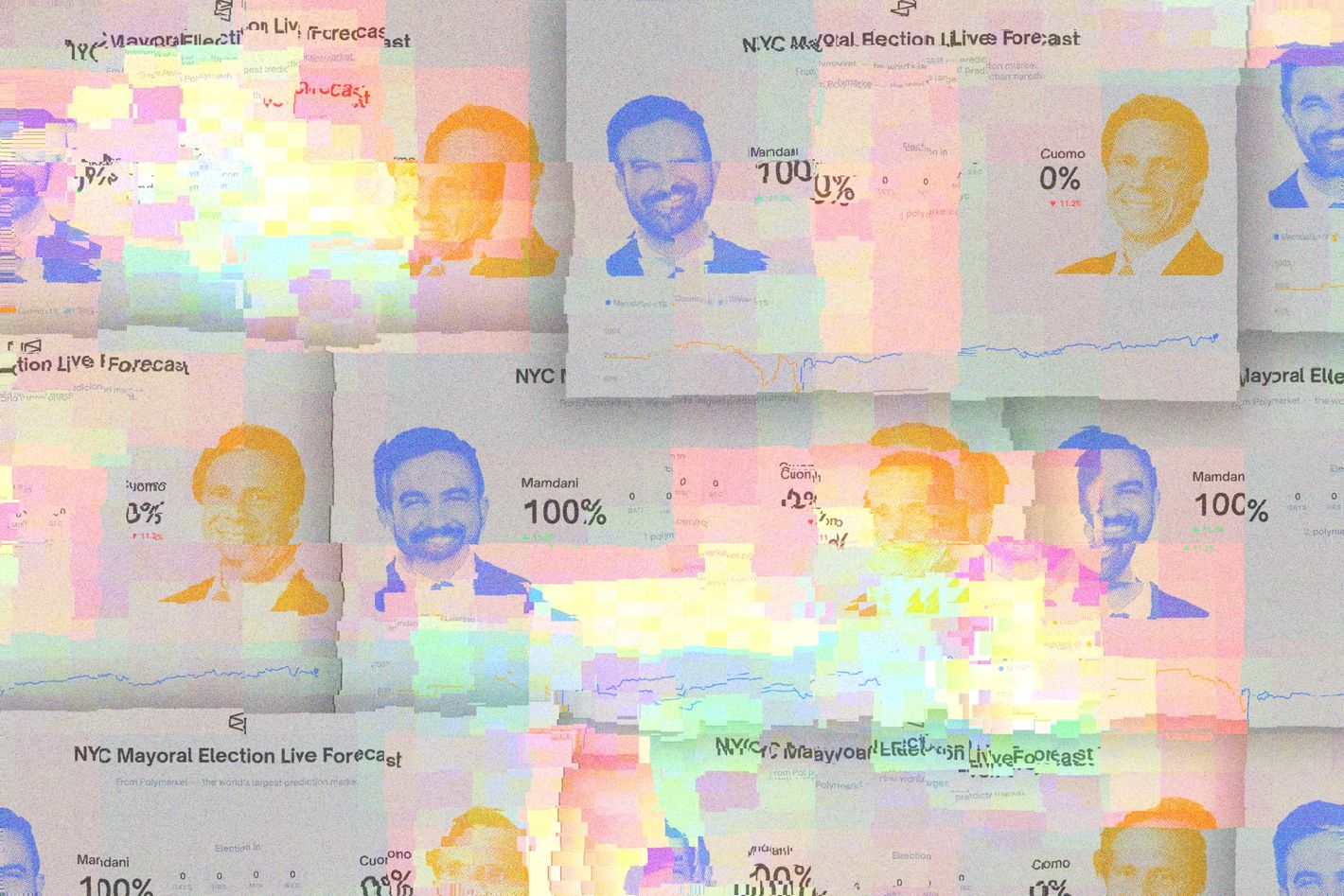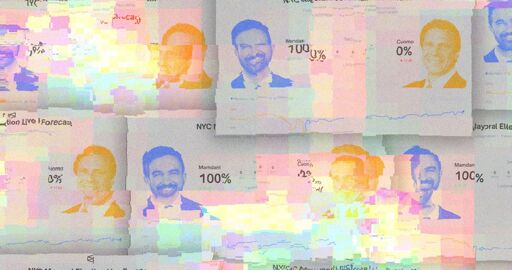
Photo-Illustration: Intelligencer; Photo: Polymarket
Of the many unprecedented features of the last New York City mayoral election, one stands out as particularly surreal: A lot of people were betting real money on the result. Polymarket, the prediction platform that isn’t yet legal in the U.S., claims to have processed more than $420 million in trading volume on the “candidate that wins” market alone (although that figure should be taken with a grain of salt). Kalshi, which is already legal here, says it processed more than $120 million.
Prediction markets, which broke through during the 2024 presidential election, had become unavoidable in just one year: LinkNYC screens flashed betting odds to sidewalk passersby between weather reports; news articles listed Kalshi and Polymarket odds alongside polling numbers; and coping Cuomo supporters, including hedge-funder Bill Ackman, spun theories about whale traders distorting the markets in Zohran Mamdani’s favor, echoing the wishful thinking of some Kamala Harris supporters in 2024. On the Flagrant podcast, when hosts brought up his Kalshi odds, Mamdani shared a story: A friend he hadn’t talked to in years had texted him, “Yo, bro, I just put a thousand on you, please don’t let me down.” It got some of the biggest laughs of the episode.
Zohran Mamdani shares that his friend put $1,000 on him to win the primary election on Kalshi. He has a 92% chance of winning the mayor race, according to Kalshi traders.pic.twitter.com/UX93A88nuw
— Pop Crave (@PopCrave) October 23, 2025
Prediction marketplaces were clearly enjoying their come-up. Bettors had been flocking to the platforms, making ever-more-specific bets on a widening range of real-world outcomes. (On Kalshi, $16 million of trades have been made on the question of Mandani’s winning margin, which remains unresolved until final tabulations come in; “9-11.99%” currently leads over “6-8.99%,” 61% to 38%.) The platforms, which have always leaned into trollish marketing, spent the mayoral election honing their institutional voices and expanding their editorial output, albeit mostly on X, cranking out posts about bets but also general news. Sometimes it’s clear engagement bait; other times it’s suggestive insider-y betting fodder:
BREAKING: Zohran Mamdani listed twice on the ballot for today’s NYC Mayoral Election.92% chance he wins. pic.twitter.com/f675emw0YK
— Polymarket (@Polymarket) November 4, 2025
BREAKING: Cuomo holds significantly more support inside of NYC than Mamdani, per Kalshi data. pic.twitter.com/CNW0nvlEQp
— Kalshi (@Kalshi) November 3, 2025
Max Read notes that these companies are posting in a familiar style. “If you still spend time on X.com, you will recognize here precisely the same clipped, decontextualized, link-free, moronically breathless style of tweeting deployed by ‘financial news for low-trust illiterates’ accounts like Unusual Whales or ZeroHedge (or, for that matter, in a slightly different arena, PopCrave),” he writes. To be slightly more generous about it, accounts like this have, on a platform where outside links barely exist, mainstream media brands are no longer visible, and commentary crowds out timely updates, stepped in to fill a market need, as strange and distorted as it may be.
As Read points out, Kalshi and Polymarket are also speaking the language of their most devoted users — “epistemically captured right-wing hobbyist gamblers and speculators — and meeting them where they are, on X, which is another way of saying it’s just good marketing. But, in the spirit of prediction, I think material like this will soon be more than a sideshow and already sketches an outline of a new, prediction-centric political media. Gambling took over sports coverage, after all. Why won’t it take over everything else?
Last year, Tommy Craggs documented for Bloomberg the total capitulation of sports coverage to the industry, and logic, of gambling. “It’s not just that the more than $10 billion sports betting industry has saturated sports media,” he wrote. “It’s that the sports betting industry is, in a sense, the sports media.” Publications were starting their own books, while betting giants like DraftKings seemed to sponsor everyone else (and have since defeated most of their media competitors). After a sale, Fox Sports Networks became the FanDuel network; to watch sports on other channels is to sit through ad after ad for sports books, most of which sponsor teams, stadiums, leagues, and streaming platforms.
Online and on TV, coverage is increasingly driven and mediated by the assumption that audiences are also be gambling, and the content reflects this with an endless supply of articles about betting odds and entire shows devoted to talking through gambling strategies. You can’t read about sports without hearing about spreads. You can’t watch sports without talking heads sharing bets. If you find yourself waiting around long enough with a bunch of other dads from your kids’ school, and you end up in a conversation about sports, you’ll soon find out that you’re really in a conversation about who is betting on what and why. This is either catastrophically bleak or just a bunch of people enjoying their new freedom and having fun, depending on how you look at it. It’s certainly changed how people relate to sports and consume them. As Craggs writes, with omnipresent gambling, sports are reduced — or perhaps elevated — into something “exploitable,” rather than just consumable and enjoyable.
Politics is not a game, of course, and accusing the political media of comporting itself like sports media has been a go-to insult for the better part of a century now. “The kinds of data obtained by public-opinion research and disseminated in the mass media seem designed more to entertain than to inform,” wrote the social psychologist Milton Rokeach in 1968, before crystallizing what would become a regular complaint about horse race — in his case, “racehorse” — coverage. “The quality of the information conveyed seems not much different from that conveyed in the sports pages or, better yet, the daily racing form.”
Gambling sensibilities had already ruined political coverage, the story went, and nobody was even betting on elections yet. Today, you’re less likely to encounter a tired lament about horse-race coverage (except this one) than a nuanced defense of prediction markets from a figure like polling guru and professional gambler Nate Silver, who consults for Polymarket, on the basis that they’re useful for revealing the wisdom of the crowd, codifying conventional wisdom, and forcing people to put their money where their mouths are, which, well, they are. Further afield, you’ll find people musing again about how prediction markets might be integrated into a form of governance called futarchy. Prediction markets might not be fully respectable, whatever that means, but they’re increasingly seen as legitimate.
They’re also, unlike the news media, growing rapidly and drawing more attention by the day, especially among some of America’s most checked-out demographics. For a lot of people, the reasons for keeping up with politics and engaging deeply with political media are obvious or just intuitive: Electoral outcomes might affect their lives and the future of the place they live; because it’s an expression of their core values; because they want to figure out how to vote; because they feel a responsibility to stay informed; because they’re excited or afraid or simply can’t resist allure of the feed; because they’re “junkies” addicted to the spectacle or experience electoral politics like a fandom. For others, though, none of that is half as compelling as the prospect of winning a bet and turning a collective political contest into a personal one. Meeting that person where they live could be a better business than selling subscriptions or serving ads, or at least a plausible alternative. They might already own some crypto, and they’re inclined to play with it.
BREAKING: Trump is more likely to become the next US President than AOC - despite being constitutionally ineligible pic.twitter.com/V7p7OtcIpZ
— Kalshi (@Kalshi) November 10, 2025
If more people put more money into markets like Kalshi, it’s easy enough to imagine how a sportslike media transformation might unfold through sponsorships, normalization in existing media, constant metacoverage of prediction odds, and content produced by the prediction platforms themselves. Aside from its posting habits, Polymarket already has a podcast; on the websites of shrinking newspapers around the country, you can already find aggregated articles sharing the current betting odds for the 2028 election. (J.D. Vance +225, Gavin Newsom +350, and Alexandria Ocasio-Cortez +900 in case you were curious and know what that means.) Why wouldn’t fast-growing companies in a wildly lucrative but competitive industry hire or sponsor some influencers to make some content, draw some attention, and convert some customers? Why shouldn’t they convene, say, a Jubilee in which participants argue about their bets on politics rather than politics as such? I’ve got $5,000 on J.D. Vance 2028. Change my mind.
There are other signs of convergence already. Google is planning to include Polymarket predictions in its Finance product, potentially showing them to millions of casual users. And Donald Trump’s Truth Social, which is nominally a social-media company, recently announced its intention to open a prediction market of its own, which is both an act of clear bandwagoning and genuinely cutting edge in terms of potential ideas for corruption.
There’s an argument, although I’m not sure I’d put money on it, that a political media financed by gambling businesses would be no worse — or at least not much worse — than one financed by, say, advertising and that such an arrangement might draw more attention toward cold prediction and investigative reporting than business models that incentivize attention for attention’s sake. You can stretch this argument even further and maybe suggest that the financial media, where a lot of coverage is intended and consumed as actionable analysis to feed into fast-resolving bets, is a relevant example as well. (Although, as Read suggests, the state of the art in financial media today is less Bloomberg than “anonymous X account misleadingly reposting Bloomberg terminal headlines.”) But it’s not clear what sort of new media would best serve a company like Polymarket or Kalshi. Is it one that helps bettors make more rational decisions or one that muddies the waters and plays to bettor bias? If prediction markets get big enough, there’s probably room for both.
If political media really does step into the flashing probability matrix, it’s probably worth pointing out what happened next for sports: an accelerating run of massive, sometimes even athlete-involved scandals, which have recently implicated online betting platforms directly. The most absurd possible consequences of the mainstreaming of sports betting — that all coverage would recenter around it and that gambling outcomes would become more important than game outcomes, even for some of the people playing in them — are becoming more plausible by the day. On a long enough timeline, and with enough money at stake, are we sure American politics is so different?
From Intelligencer - Daily News, Politics, Business, and Tech via this RSS feed

